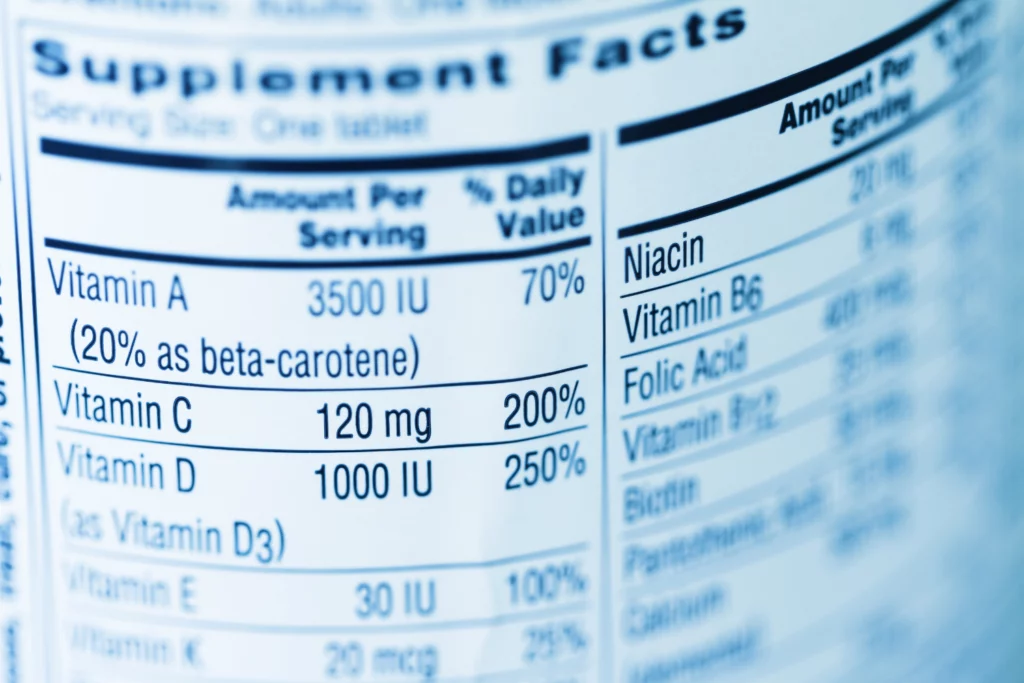Choosing high-quality, scientifically backed supplement ingredients is essential for building a successful nutrition brand. As the supplement industry grows, consumers are increasingly seeking dietary supplements that are both effective and safe. By focusing on ingredients supported by clinical research and compliant with regulatory bodies like the FDA (for safety and labeling) and EFSA (for claim approval), brands can ensure their dietary supplements stand out in a competitive market. Using well-researched dietary ingredients supports health claims and helps maintain consumer trust, enhancing overall health and wellness outcomes.
Table of Contents
ToggleWhy Scientifically Backed Ingredients Matter for Your Brand’s Success
Using scientifically backed ingredients in your dietary supplements is crucial for standing out in a crowded market. These ingredients improve product quality, build trust with your consumers, and meet critical regulatory standards.
Building Consumer Trust
When your dietary supplements use ingredients supported by scientific research, it creates trust and credibility with your customers. Consumers want to know that the supplement ingredients they’re taking are safe, effective, and backed by studies. By prioritizing evidence-based ingredients, your brand can attract more informed buyers who seek reliable dietary supplements.
Ensuring Product Effectiveness
Scientifically supported ingredients ensure that dietary supplements deliver the intended benefits. Whether supporting cardiovascular health, cognitive function, or muscle recovery, well-researched ingredients like amino acids, omega-3 fatty acids, and herbal extracts can help dietary supplements deliver science-backed benefits. This improves customer satisfaction and encourages repeat purchases, supporting brand loyalty.
Meeting Regulatory Standards
Regulatory agencies like the Food and Drug Administration (FDA) and the European Food Safety Authority (EFSA) often require scientific evidence to verify the safety and effectiveness of dietary ingredients. By using science-backed ingredients, your brand can confidently meet these standards, ensuring compliance with Food and Drug Administration regulations and other industry guidelines, which helps prevent legal issues and ensures your products are safe for the market.

Key Steps in Choosing Scientifically Backed Ingredients
Choosing the right supplement ingredients involves understanding your target market’s health needs and backing up your claims with scientific evidence. Here are the steps to guide you through this critical process.
Understand the Health Benefits You Want to Offer
First, identify the health concerns your target audience is most focused on. Are they looking for weight loss supplements, energy boosters, or brain health enhancers? Knowing this helps you select dietary ingredient options that specifically address these concerns. For example, people seeking to improve their immune system may look for Vitamin C or fish oil food supplements. At the same time, those interested in increasing muscle mass might prefer protein nutritional supplements or branched chain amino acids.
Next, connect your product’s benefits to scientifically supported claims. For example, clinical studies suggest that weight loss supplements containing green tea extract may support metabolism and fat reduction. Aloe vera is more commonly used for digestive health, though further research is needed to confirm its effects on fat loss. By using these ingredients, you can make strong, science-backed claims that align with consumer health goals, increasing the credibility of your products.

Research Clinical Studies and Evidence
To ensure the effectiveness of your dietary supplement, it’s important to research scientific studies that support its ingredients.
Where to Find Credible Research
When searching for reliable studies, use PubMed, Google Scholar, the National Center for Complementary and Integrative Health (NCCIH), and the Office of Dietary Supplements (ODS) databases to find clinical trials and research papers on specific supplement ingredients. These sources offer peer-reviewed studies, making them trustworthy for evaluating the benefits and risks of various dietary substances. By relying on this credible research, you can ensure your products are supported by scientific evidence.
How to Read and Interpret Clinical Studies
When reviewing clinical studies, pay close attention to sample size, study methods, and results. A larger sample size and a well-structured methodology indicate stronger, more reliable findings. For example, studies that show the positive effects of essential nutrients, such as fatty acids or amino acids, should have clear outcomes, demonstrating the potential benefits or risks for total dietary intake and overall health.
Look for Expert Endorsements
In addition to clinical studies, endorsements from health experts and dietitians can validate your dietary ingredient choices. Experts in Complementary and Integrative Health often highlight the benefits of using science-backed ingredients, which reassures consumers. Credible professionals supporting your dietary supplements build trust and confidence in the market.

Criteria for Evaluating Ingredients
When choosing supplement ingredients, evaluating their quality, safety, and source is vital.
Ingredient Purity and Source Transparency
Consumers today are more interested in knowing where their ingredients come from. Ensuring the purity and transparency of your supplement ingredients is key.
Organic vs. Conventional Sourcing
- Organic ingredients are grown without harmful pesticides and chemicals, making them a healthier option.
- Organic farming promotes soil health, so the ingredients used tend to be more nutrient-rich. However, the actual nutrient content of these ingredients may vary depending on various factors, including the specific crop, growing conditions, and harvesting methods.
- Organic farming is better for the environment and supports sustainable agriculture.
- Conventionally sourced ingredients are usually more affordable, making them accessible for brands with a lower budget.
- However, conventional food sources may contain pesticides or additives that some consumers prefer to avoid.
Non-GMO and Ethical Sourcing
Choosing non-GMO and ethically sourced ingredients helps build consumer confidence, though it’s important to clearly communicate the specific benefits or reasons for choosing non-GMO ingredients, as research continues to evolve in this area. Non-GMO ingredients ensure that your dietary supplement product do not contain genetically modified organisms, which many consumers prefer to avoid. Ethical sourcing also matters, as it shows your brand cares about environmental impact and fair labor practices, further building credibility in the supplement industry.
Bioavailability and Absorption
Bioavailability refers to how well a nutrient is absorbed and used by the body. Selecting supplement ingredients that are easily absorbed is crucial to maximizing their benefits.
Highly Bioavailable Ingredients
- Liposomal Vitamin C is known for its high absorption rate.
- Fish oil dietary supplements, rich in omega-3 fatty acids, are also easily absorbed by the body.
- Branched chain amino acids (BCAAs) support muscle mass and are highly bioavailable.
- Magnesium citrate is more bioavailable than other magnesium forms, improving its effectiveness.
- Turmeric with added black pepper (piperine) enhances curcumin absorption, offering greater anti-inflammatory benefits.
Safety and Tolerability
Before choosing supplement ingredients, ensure they have been tested for safety and potential side effects. Check if the ingredients have been researched for specific demographics, and always consider allergens. For example, opt for allergen-free alternatives if your target market is sensitive to common allergens like soy or gluten. This careful consideration of safety helps protect your customers and builds long-term trust in your brand.
Commonly Used Scientifically Backed Ingredients in the Health and Wellness Industry
Several supplement ingredients are commonly used in the health and wellness industry because they are backed by solid scientific research. These ingredients offer numerous health benefits and are supported by clinical studies.
Adaptogens (e.g., Ashwagandha, Rhodiola)
Adaptogens, such as Ashwagandha and Rhodiola, are natural substances that help the body manage stress. Research shows that Ashwagandha can lower cortisol levels, reduce stress, and improve overall well-being.
On the other hand, Rhodiola is known to enhance mental performance and reduce fatigue. These adaptogens are commonly used in dietary supplements for their ability to support mental health and boost energy, making them a popular choice in the supplement industry.
Antioxidants (e.g., Vitamin C, Astaxanthin)
Antioxidants like Astaxanthin play a key role in neutralizing free radicals, which can damage cells and contribute to aging and disease. This vitamin supports immunity and skin health, while Astaxanthin is known for its powerful anti-inflammatory and anti-aging properties. Numerous studies have shown that antioxidants help reduce oxidative stress and support overall health, making them essential supplement ingredients.
Probiotics and Prebiotics
Probiotics and prebiotics are crucial for maintaining gut health. Probiotics introduce beneficial bacteria into the gut, while prebiotics provide the necessary nutrients to support these good bacteria. Research shows these ingredients can improve digestion, strengthen the immune system, and positively impact mental health. Studies have shown that probiotics can balance gut microbiota, improving digestive health and overall wellness.
Omega-3 Fatty Acids
Omega-3 fatty acids, found in fish oil and other sources, are well-known for supporting brain and heart health. Clinical studies have shown that omega-3s can reduce inflammation, lower blood pressure, and improve cognitive function. Research published in in the European review for medical and pharmacological sciences have reported that omega-3s can reduce the risk of cardiovascular disease and support mental health. These fatty acids are a common ingredient in dietary supplements marketed for heart and brain health.

How to Source High-Quality Ingredients for Your Brand
Sourcing high-quality supplement ingredients is critical to the success of your nutrition brand. Working with reputable suppliers and ensuring third-party testing can guarantee dietary ingredient quality and safety.
Choosing the Right Suppliers
Partnering with reliable supplement manufacturers and suppliers is critical to ensuring the purity and potency of your supplement ingredients. Look for suppliers who provide Certificates of Analysis (CoAs), which confirm that the ingredients meet quality standards. Suppliers that offer CoAs ensure their products have been tested for contaminants, ensuring your dietary supplements are safe and effective.

Third-Party Testing and Verification
Third-party testing adds an extra assurance that your ingredients are of the highest quality.
Importance of Independent Lab Testing
Independent lab testing ensures your dietary supplement ingredients meet safety and quality standards. It verifies that the supplement ingredients are free from contaminants, heavy metals, and other harmful substances. Third-party testing ensures transparency and boosts consumer confidence in your products.
How to Find Verified Suppliers
To find suppliers that offer third-party verification, follow these steps:
- Look for suppliers who clearly advertise their testing processes and CoAs.
- Research suppliers recommended by industry associations like the National Cancer Institute, National Institutes of Health, or PubMed.
- Choose suppliers with positive reviews and testimonials from other businesses in the supplement industry.
- Verify that the supplier follows Good Manufacturing Practices (GMP) and adheres to Food and Drug Administration regulations.
- Request samples and third-party test results before making a large purchase to ensure quality.
Anticipating Your Consumers’ Next Steps
To keep consumers engaged with your nutrition brand, it’s important to anticipate their needs. This includes being transparent about your supplement ingredients and offering support in their product choices.
Transparency in Labeling
Clear and honest dietary supplement labeling is vital to building a loyal customer base. Consumers want to know exactly what’s in the dietary supplement and where the ingredients come from.
Full Disclosure of Ingredient Sourcing
Providing full transparency about ingredient sourcing on your dietary supplement labels builds trust with consumers. Customers feel more confident in your product When they know that the ingredients, such as amino acids or plant oils, are ethically sourced or non-GMO. Clear dietary supplement label claims that includes ingredient origins and sourcing practices, such as organic or conventional foods, reassures consumers about the quality and safety of the dietary supplements they use.
How to Communicate Ingredient Benefits on Packaging
When listing dietary supplement ingredients, it’s important to communicate their benefits on your packaging. For instance, if your product contains fish oil for cardiovascular health or Vitamin C to boost the immune system, use simple language backed by science. Highlighting the research and clinical studies behind the ingredients makes your product stand out and helps consumers understand how the dietary supplement health products improve their health.

Offering Consultations to Help Your Audience Choose Ingredients
Offering consultations to help influencers and brands choose scientifically backed ingredients positions your service as a trusted solution. By providing expert guidance, you can help them select dietary ingredients tailored to their audience’s needs, whether for weight loss, immune function, or overall health. This personalized approach ensures that the dietary supplement health product meets market demand and scientific standards, helping your clients build successful brands.
Why Choosing Scientifically Backed Ingredients is Crucial for Your Brand
Selecting scientifically backed supplement ingredients is vital to creating high-quality, effective dietary supplement products that meet consumer expectations and regulatory standards. By choosing ingredients supported by clinical research, you build trust with your customers and ensure the safety and effectiveness of your products.
Offering personalized consultations helps influencers and brands choose the right ingredients tailored to their market needs, further positioning your brand as a trusted expert in the supplement industry. Contact us today to learn how we can assist you with ingredient selection and product formulation.
Frequently Asked Questions
Why is it essential to use scientifically backed supplement ingredients?
Using scientifically backed ingredients ensures that your dietary supplements are safe, effective, and trusted by consumers.
How can I verify the quality of my supplement ingredients?
Partner with suppliers who provide Certificates of Analysis (CoAs) and use third-party testing to ensure ingredient purity and potency.
What are the benefits of offering consultations for ingredient selection?
Consultations help tailor ingredient choices to your target market’s needs, improving product effectiveness and customer satisfaction.
How do I communicate the benefits of ingredients on supplement packaging?
Clearly highlight the scientifically supported benefits of each ingredient, such as immune system support or muscle gain improvement.
Where can I find credible research on supplement ingredients?
Use platforms like PubMed, Google Scholar, and academic journals to find reliable, peer-reviewed clinical studies on dietary supplement ingredients.
References
- Federal Trade Commission. Truth In Advertising. Federal Trade Commission. https://www.ftc.gov/news-events/topics/truth-advertising
- Jain, A. P., Aggarwal, K. K., & Zhang, P. Y. (2015). Omega-3 fatty acids and cardiovascular disease. European review for medical and pharmacological sciences, 19(3), 441–445. Retrieved from https://pubmed.ncbi.nlm.nih.gov/25720716/
- National Center for Complementary and Integrative Health. Dietary and Herbal Supplements. U.S. Department of Health and Human Services. https://www.nccih.nih.gov/health/dietary-and-herbal-supplements
- National Institutes of Health, Office of Dietary Supplements. Office of dietary supplements. National Institutes of Health. https://ods.od.nih.gov/
- National Library of Medicine. Dietary supplement label database. U.S. Department of Health and Human Services. https://ods.od.nih.gov/Research/Dietary_Supplement_Label_Database.aspx
- Robinson, J. G., Ijioma, N., & Harris, W. (2010). Omega-3 fatty acids and cognitive function in women. Women’s health (London, England), 6(1), 119–134. https://doi.org/10.2217/whe.09.75
- U.S. Department of Agriculture. (2024). FoodData Central. U.S. Department of Agriculture. https://fdc.nal.usda.gov/
- U.S. Food and Drug Administration. (2024). Dietary supplements. U.S. Department of Health and Human Services. https://www.fda.gov/food/dietary-supplements




